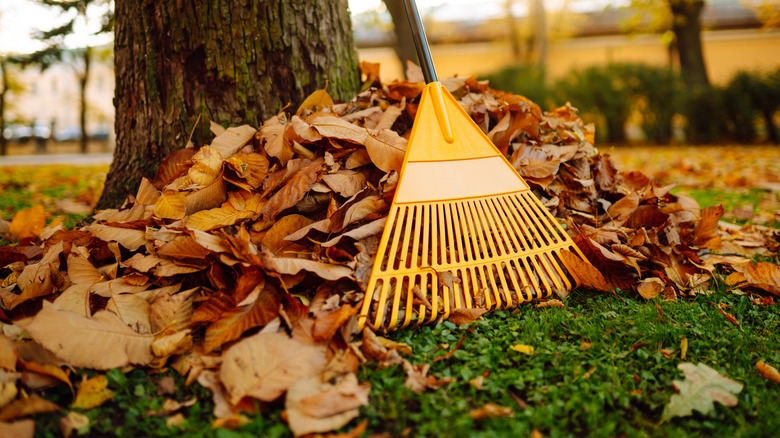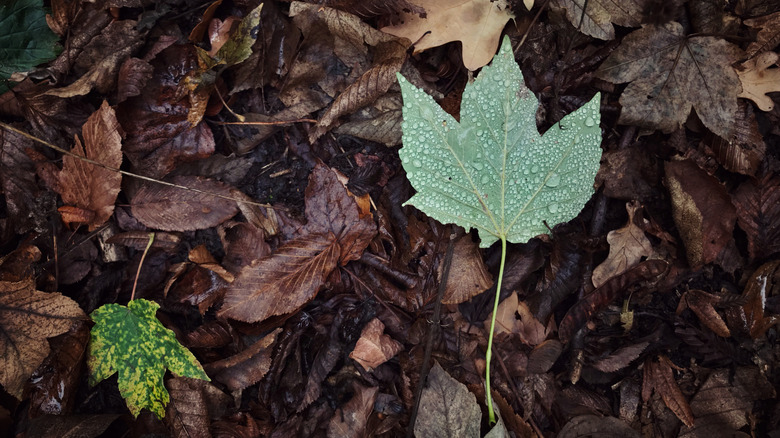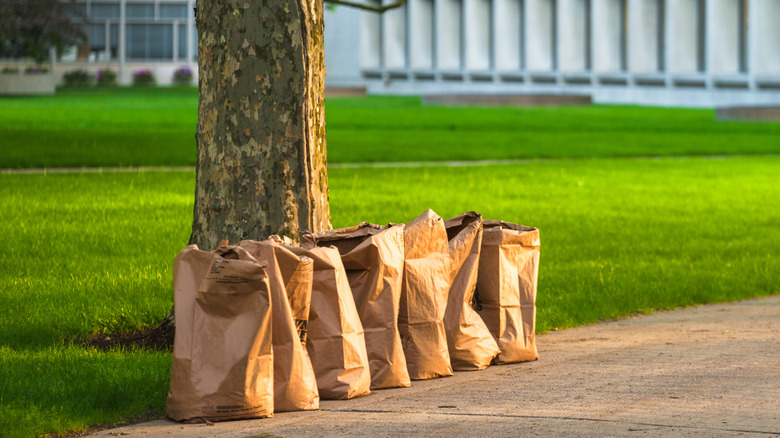The Controversy Behind Raking Fall Leaves (& If You Should Or Shouldn't Do It)
Raking leaves is synonymous with fall, much like taking hayrides, visiting pumpkin patches, and letting pots of mums die on your front porch. But more and more people are speaking out against raking leaves – their argument being that the natural decomposition of leaves is better for the environment than dumping bags of them in a landfill. That said, we all know that leaving a thick layer of leaves on your yard will kill your grass, giving you a brown lawn come spring. This conundrum is enough to make you wonder whether you have to choose between either caring about the environment or keeping a nice green lawn.
"Leave the Leaves" is a campaign first coined by the National Wildlife Federation in a 2015 article, but it has only taken off in the last few years. USA Today, The New York Times, the Associated Press, and many others have run articles on the subject, and naturalists from The Environmental Protection Agency and USDA are begging homeowners not to rake and bag. In 2023, the National Wildlife Federation dubbed October "Leave the Leaves Month" in an effort to spread further awareness.
One of the major arguments for leaving leaves is that various species make their homes in the leaf layers, creating an entire ecosystem in the process. For many suburban homeowners, meanwhile, this is a huge argument against leaving leaves, because the piles can hide snakes, rodents, ticks, spiders, and other harmful creepy crawlies. The perfectly valid arguments both for and against "leaving leaves" have many yard owners searching for a middle ground, and as luck would have it, we might have one for you.
What are reasons against raking leaves?
First off, though, let's look deeper into this "leave the leaves" business. The basic reality of it all is that if fallen leaves are left to their own devices, they will decompose, creating natural fertilizer, mulch, and weed killer. This is beneficial for your lawn and the environment (not to mention your bank account). Store-bought mulch often contains dyes that leach into the soil, killing good bacteria and beneficial insects, while weed killers and fertilizers can contain toxic chemicals.
An added benefit is that it keeps the leaves out of landfills. Now, if leaves are biodegradable, you may be wondering why there's such an uproar about sending them to a landfill. According to the Environmental Protection Agency, yard waste accounts for about 12% of municipal solid waste (MSW) in the U.S, weighing in at roughly 35 million tons. And leaf bags are rarely placed in the incinerator, as they are too wet and contribute to harmful smog-producing gases when burned. Besides taking up a fair amount of space, when leaves decompose around garbage, they can release toxic methane gas into the environment.
Should you leave the leaves?
So yes, to a point, it's good to leave the leaves. For one, if your yard is covered around 20% or less, you can leave them without harming your grass. Any more than that, though, and we have a good compromise for you: Mulch the leaves using your lawn mower.
Mowing the leaves is much quicker and easier than raking, and you won't have to worry about proper leaf disposal. The mower cuts the leaves into small enough pieces that it doesn't kill your lawn, and as the bits of leaves decompose, they add nutrients to the soil. It is best to do this when the leaves are dry, so they won't clump together. If the mulch layer is still too thick for your grass, consider throwing some of the mulch into your compost bin. Leaves decompose more easily in compost if they have been mulched, so it is the perfect solution for excess leaves, especially if you already practice home composting.
If you still prefer raking and removing fallen leaves from your yard, don't dismay. Simply place your leaves in compostable yard waste bags and send them to a mulch facility, instead of the landfill. Nearly half of the states no longer allow citizens to place yard waste in the garbage, and some are even saying goodbye to food waste in the garbage as well. If you live in one of these states, chances are you can receive free yard waste pickup. Other areas offer this service for a small fee, and others require you to personally drop your bags at a mulching facility. If you have questions about yard waste removal, you can usually find the answer on your city's website, or through your local waste management company.


